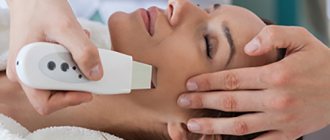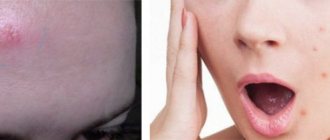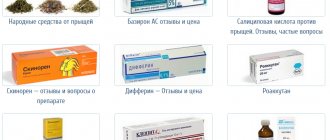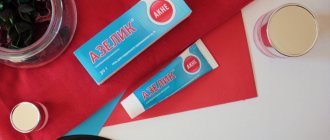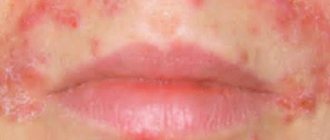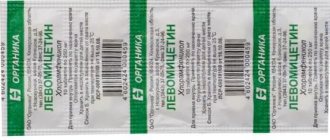- Causes of unpleasant odor from acne
- Subcutaneous pimple with an unpleasant odor
- How to get rid of acne with an unpleasant odor
According to the American Academy of Dermatology and Acne, acne is the most common and complex inflammatory skin disorder, affecting at least 50 million American adults and teenagers. The inflammatory condition involves problems with the skin's sebaceous glands, which become clogged with dead skin cells and excess oil, trapping bacteria in pores This causes an inflammatory response and leads to the development of pimples, some of which contain pus. Pus can emit a foul odor due to the byproducts of bacteria feeding on the skin's oil.
Causes of unpleasant odor from acne
Acne - bacteria
A type of bacteria called Propionibacterium acnes (P acnes) usually lives deep in the oily pores of the skin because it feeds on the skin's oil, also known as sebum. People with acne usually have an overgrowth of P acnes, likely due to excess sebum production. People with acne also have an exaggerated immune response to P acnes, which leads to inflammation of the pores and a buildup of white blood cells. An inflammatory response to trapped bacteria, as well as a buildup of sebum, dead skin cells, and white blood cells in the pores, leading to the appearance of pus. People with moderate or With severe acne, these pimples can grow into larger nodules or cysts and even develop an unpleasant pimple odor.
Odor associated with bacteria:
Many types of bacteria produce odors as they grow. These odors come from the by-products produced by the bacteria feeding on various substances. P acnes has specialized enzymes that allow the bacteria to break down and feed on sebum. This breakdown results in the formation of propionic acid and chemicals called short-chain chemicals. fatty acids While sebum is odorless, side effects from the breakdown of sebum oil P acnes release an odor that many patients describe as a bitter or sour body odor.
Types of Bacteria that Infect a Pimple and Cause Bad Odor
There are different types of bacteria that can harm hair follicles, causing clogged pores that can result in zits. These different types of bacteria have a completely different effect on how these odors smell. Aerobic bacteria, which depend on the growth of oxygen, usually do not cause a foul smell with rot. zit, while those anaerobic bacteria that produce sulfur can cause zit to smell bad.
Bacteria are usually present on the skin, and some of them are beneficial. But harmful bacteria, such as Staphylococcus aureus, may also be present. Blocked pores provide a breeding ground for bacteria and can become infected as the bacteria attack the biological building materials in them. The odor is unlikely to be very noticeable. If the smell is very noticeable, then this may indicate a more serious infection, and you should consult a doctor as soon as possible.
Pimple pus smell
When small, common pimples produce a small amount of pus, it is unlikely that you will notice any odor. In this case, the amount of odor-producing chemicals is usually too low to cause a noticeable odor. However, because large nodules of dead cells and cysts contain a large amount of pus and bacterial debris, you may notice an unpleasant odor from these types of pimples as well.
Dead skin cells
As new skin cells develop in the dermis, old skin cells are forced out. The outermost layer of skin cells, the stratum corneum, is made up of about 20 layers of dead skin cells that gradually slow down. But in acne, dead skin cells can get trapped in the pores, and instead of peel off, they form a fork with sebum. They can begin to disintegrate in the pores, which contributes to the problem of foul-smelling pus from the pimple.
Although the foul odor caused by pus usually affects severely infected skin that contains a large amount of pus, it is not a major problem for your health. Instead of trying to determine what your pimple smells like, it is better to pay close attention to the symptoms of its development. skin disease and as accurately as possible in the future explain to the dermatologist the entire course of the disease.
Pimples in the groin and pubic area: what they look like and why they occur
Formations in the groin and pubic area are a nuisance that can affect both women and men of any age. Sometimes acne in the groin is caused by completely harmless and easily removable factors - insufficiently careful hygiene, incorrectly selected underwear or poor shaving technique.
However, there are also more serious reasons, signaling that something is wrong in the patient’s body. We will dwell on them in more detail.
Infectious and viral diseases as the cause of acne on the pubis and groin
This is the option that our clinic’s specialists suggest first. The most common diseases are:
- lice pubis: small purulent pimples appear at a certain stage of the disease;
- syphilis: this disease is characterized by the appearance of one or several pimples on the pubic part of men (often looks like an ulcer and is located on the genital organ itself). In women, in addition to the pubis, they are sometimes observed on the labia. This formation is called chancre. It has a smooth surface with shiny edges, does not cause pain, but is a colorful symptom of the development of a dangerous disease in the body;
- genital herpes: one of the signs of the disease is small, blistering-like pimples on the pubic area in women and on the genitals and testicles in men;
- human papillomavirus: its filamentous variety almost always affects the pubis and in a non-inflamed state is a wart, but only until the patient, by directed or random actions, provokes its inflammation and suppuration;
- mycosis: a fungal disease, one of the external signs of which may be pimples like burn blisters between the legs, in the gluteal fold, on the genitals and in the lower abdomen;
- molluscum contagiosum: a pathogen transmitted sexually or through household contacts that provokes pubic acne in women and men with cheesy contents.
Other causes of acne in the inguinal-pubic area
In addition to specific diseases, acne in intimate places can break out for the same reasons as on any other parts of the body: due to endocrine disruption or disruption of internal organs, excess weight, improper diet, hypothermia, diabetes. In addition, acne in the groin in women can form during ovulation and PMS, during pregnancy, lactation and premenopause.
It is not worth determining the initial prerequisites on your own, and even more so trying to get rid of acne by squeezing, independently selecting medications and folk remedies - this is fraught with much more serious consequences than just education in a sensitive area. Therefore, anyone who has a similar problem is expected to see highly qualified specialists at our medical center.
Diagnosis of causes and treatment at the Private Practice clinic
The first step in treating acne, including in the inguinal-pubic area, is to establish the causes of its appearance. Based on this, further tactics of working with the patient are determined. Sometimes recommendations related to personal hygiene, caring for problem areas of the skin and following hair removal rules are sufficient.
In more complex cases, we prescribe a comprehensive examination, including examination of stool for intestinal microflora, blood tests for general indicators, biochemistry and hormones, ultrasound of the digestive organs and kidneys, scrapings, cultures and biopsy. If an infectious etiology is suspected, we refer the patient for STD testing. All laboratory and instrumental studies are performed in our clinic, which is equipped with a modern laboratory and equipment.
Based on the results of the research, our dermatovenerologists select effective complex therapy that is guaranteed to cure groin acne in men and women with a minimal risk of relapse.
Pimples on the pubic area should not be taken lightly, because they can serve as a symptom of dangerous sexually transmitted infections. In this case, the success of treatment largely depends on the stage of the disease. See your doctor on time and be healthy!
You can make an appointment at a convenient time. The doors of our clinic are open for you every day from 09:00 to 21:00.
You can make an appointment with a doctor by calling
+7+7 (495) 980-13-16
Subcutaneous pimple with an unpleasant odor
Poll: When did your acne appear? (Number of votes: 4295)
I've been suffering all my life
It's been a couple of years now
About a few months
Recently
To vote, click on the desired answer. results
A subcutaneous pimple with an unpleasant odor usually appears as a sebaceous cyst - a small lump of oil and pus located under the skin. This type of cyst is not cancerous.
They most often occur on the face, neck, and upper back, but can occur on other areas of the body.
Typically, a sebaceous cyst grows very slowly and does not cause pain.
However, they can become inflamed or infected, with the overlying skin becoming red, tender and painful to the touch.
How to get rid of acne with an unpleasant odor
Most recommended acne treatments directly or indirectly reduce the overgrowth of P. acnes in the sebaceous glands, thereby reducing the likelihood of foul-smelling pus. Topical benzoyl peroxide products, for example, kill some of the P. acnes on the skin.
These products are recommended for use either alone or in combination with other acne treatments Oral antibiotic therapy also reduces P. acnes populations and is recommended for some people with acne Topical retinoids such as tretinoin (Retin-A), adapalene (Differin) and tazarotene (Tazorac ), in the form of a gel or lotion.
Zits, or foul-smelling pimples, are usually more common in men, although women can experience them too. Although this skin breakout usually occurs on the facial skin, zits can also spread throughout the skin of the body. Zits are always filled with pus, which is usually solid white or yellow. color Pus is dead white blood cells that fight off infecting bacteria. As anaerobic bacteria, these bacteria do not require oxygen to survive. Instead, they produce their own sulfur compounds when they grow and spread through the internal channels of the skin.
A strong odor may be noticed if the zit is infected with an anaerobic type of bacteria. On the other hand, bacteria growing and spreading with oxygen usually does not cause a foul odor. A mild zit problem usually does not lead to that foul odor, while a severe infection tends to result in an odor. , as the body produces more of the pus contained in the zits.
The stronger the odor, the more likely the zit will be contagious. This means that if you detect a foul odor, the infecting bacteria will enter other skin pores, causing another similar pimple. Therefore, it is important to clear any purulent zit to prevent further infection and bacterial infestation Therefore, it is important to clean any purulent abscess to prevent further spread of infection and bacterial infestation.
What to do?
To fix the problem, you need to find out the cause.
First, you should undergo a full medical examination, which consists of a series of blood tests and examination of the digestive organs. This will help accurately diagnose the cause of the unpleasant odor from acne. The doctor prescribes treatment based on the situation. Most often it is recommended to increase the number of times hygiene procedures are carried out. It is also recommended to wipe the affected areas with products that contain an antibacterial effect or tonics based on herbal extracts of calendula or chamomile. This procedure should be carried out after each wash - up to three times a day. If the skin secretes a lot of secretions, you can use a product based on alcohol and lemon juice. This combination will reduce the secretion of sebum and relieve inflamed pimples and acne.
If comedones are severely affected, you can make oatmeal decoctions. To do this, you need to pour two tablespoons of cereal with a glass of hot water and add a teaspoon of salt. Give it time to infuse. Wipe the skin with this solution 2 times a day, then apply moisturizer. Treatment with this method is gentle and does not cause harm to the body.
It is always worth remembering that every cell of the epidermis needs special care. Don't forget about cosmetic cleansing, which can remove blockages in the pores and give your skin a clean look. Use decorative cosmetics only from certified companies, pay attention to the composition and date of manufacture. Reduce consumption of fatty, fried and salty foods. Drink more water, because it can remove toxins from the body.
